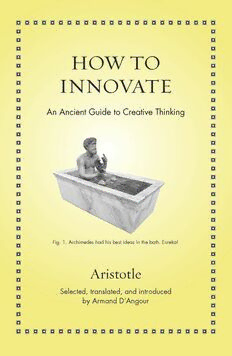Table Of ContentHOW TO INNOVATE
Ancient Wisdom for Modern Readers
For a full list of titles in the series, go to https:// press
. princeton . edu / series / ancient - wisdom - for - modern - readers .
How to Innovate: An Ancient Guide to
Creative Thinking by Aristotle
How to Be a Farmer: An Ancient Guide to
Life on the Land by Many Hands
How to Tell a Joke: An Ancient Guide to the
Art of Humor by Marcus Tullius Cicero
How to Keep an Open Mind: An Ancient Guide to
Thinking Like a Skeptic by Sextus Empiricus
How to Be Content: An Ancient Poet’s Guide
for an Age of Excess by Horace
How to Give: An Ancient Guide to
Giving and Receiving by Seneca
How to Drink: A Classical Guide to the Art
of Imbibing by Vincent Obsopoeus
How to Be a Bad Emperor: An Ancient Guide
to Truly Terrible Leaders by Suetonius
How to Be a Leader: An Ancient Guide
to Wise Leadership by Plutarch
How to Think about God: An Ancient Guide for
Believers and Nonbelievers by Marcus Tullius Cicero
How to Keep Your Cool: An Ancient Guide
to Anger Management by Seneca
How to Think about War: An Ancient Guide
to Foreign Policy by Thucydides
HOW TO
INNOVATE
An Ancient Guide to
Creative Thinking
Aristotle
Selected, translated, and introduced
by Armand D’Angour
PRINCE TON UNIVERSITY PRESS
PRINCE TON AND OXFORD
Copyright © 2021 by Armand D’Angour
Princet on University Press is committed to the protection of
copyright and the intellectual property our authors entrust to us.
Copyright promotes the prog ress and integrity of knowledge.
Thank you for supporting f ree speech and the global exchange of
ideas by purchasing an authorized edition of this book. If you
wish to reproduce or distribute any part of it in any form, please
obtain permission.
Requests for permission to reproduce material from this work
should be sent to permissions@press .p rinceton . edu
Published by Prince ton University Press
41 William Street, Princet on, New Jersey 08540
6 Oxford Street, Woodstock, Oxfordshire OX20 1TR
press . princeton . edu
All Rights Reserved
Library of Congress Cataloging-in-Publication Data
Names: Aristotle. Works. Selections. English. | Aristotle. Works.
Selections. | D’Angour, Armand, editor, translator,
writer of introduction.
Title: How to innovate : an ancient guide to creative thinking /
Aristotle [and others] ; selected, translated, and introduced
by Armand D’Angour.
Description: Princeton : Princeton University Press, [2021] |
Includes selections of works by Aristotle, Athenaeus, and Diodorus. |
Includes bibliographical references and index. |
In English and Greek.
Identifiers: LCCN 2021010048 | ISBN 9780691213736
(hardback ; acid-free paper) | ISBN 9780691223599 (ebook)
Subjects: LCSH: Technological innovations—Greece—Early
works to 1800. | BISAC: PHILOSOPHY / History &
Surveys / Ancient & Classical | SELF-HELP / Creativity
Classification: LCC T16 .H69 2021 | DDC 609/.009—dc23
LC record available at https://lccn.loc.gov/2021010048
British Library Cataloging- in- Publication Data is available
Editorial: Rob Tempio and Matt Rohal
Production Editorial: Sara Lerner
Text and Jacket Design: Pamela L. Schnitter
Production: Erin Suydam
Publicity: Maria Whelan and Amy Stewart
Copyeditor: Kathleen Kageff
Jacket Credit: Statue of Archimedes in a bathtub, demonstrating
the principle of buoyant force. Located at Madatech, Israel’s
National Museum of Science, Technology, and Space.
Photo: Aquatarkus / Shutterstock
This book has been composed in Stempel Garamond
Printed on acid-f ree paper. ∞
Printed in the United States of Ameri ca
1 3 5 7 9 10 8 6 4 2
Thinking new thoughts e very day
νέα ἐϕ’ ἡμέρῃ ϕρονέοντϵς
—Democritus, phi los o pher,
fifth century BCE
CONTENTS
preface ix
introduction xiii
1 Princi ples of Change 1
The Logic of Change 9
2 The Conditions of Creation 18
The Eureka Imperative 31
3 The Princi ple of Disruption 52
A Winning Strategy 59
4 The Benefits of Competition 68
The Father of Invention 77
5 The Uses and Abuses of Innovation 82
Aristotle on Constitutions 87
further reading 135
PREFACE
It used to be said that the ancient Greeks were
not keen on innovation. That view was based on
a partial and insufficiently discerning interpre-
tation of the evidence of ancient writings, and
historians now recognize that the Greeks w ere
never as disinclined to innovate as had been as-
sumed. In fact, what requires explanation is the
conspicuously innovative achievement that has
always been recognized as a feature of ancient
Greek society. Certain conditions, fertile for in-
novation, must have allowed for the range of
inventions and discoveries that makes ancient
Greek culture so influential for its inheritors in
subsequent generations.
In addition to t hese conditions, vari ous mech-
anisms can be seen to underlie their innovative
practices: mechanisms such as the borrowing
ix
HOW TO INNOVATE
and adaptation of external ideas, the cross-
fertilizing of disparate disciplines, and the posing
of disruptive critiques to the ideas and practices
of their pre de ces sors.
These princi ples of innovation w ere not sys-
tematically formulated by the Greeks them-
selves. They emerge from vari ous writings that
address the notion of innovation in dif fer ent
ways. The format of this book therefore, while
taking a single and overridingly influential au-
thor, Aristotle, to provide the central texts,
adduces other less well known ancient sources
to illustrate innovations that represent the key
mechanisms of the Greeks’ innovative practices.
Note on the Texts
For ease of matching translation to the original,
I have divided up the texts of Aristotle and Ath-
enaeus into shorter paragraphs and provided a
new alphabetic numeration for each section.
x

